Fleurs du Mal Magazine


Or see the index

Lovers
I thought, because we had been friends so long,
That I knew all your dear lips dared intend
Before they dawned to speech. Our thoughts would blend,
I dreamed, like memories that faintly throng.
Your voice dwelt in me like an olden song.
Petal, I thought, from petal I could rend
The blossom of your soul, and at the end
Find still the same sweet fragrance. I was wrong.
Last evening in our eyes love brimmed to birth;
Our friendship faded, lost in passion’s mist.
We had been strangers only! Here, close-caught
Against my heart the dim face I had sought
So long! And now the only thing on earth—
Your piteous mouth, a-tremble to be kissed!
Arthur Adams
(1872-1936)
Lovers
• fleursdumal.nl magazine
More in: Adams, Arthur, Archive A-B, Archive A-B
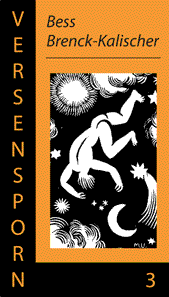
Das Auge flog voran
Das Auge flog voran.
Im Stern verstrickt der Fuß.
Die hingerissene Sonne
Sinkt im Spiegel.
Um jede Wassermühle
Blutet Licht.
Bess Brenck-Kalischer
(Betty Levy, 1878-1933)
Das Auge flog voran
• fleursdumal.nl magazine
More in: # Classic Poetry Archive, Archive A-B, Archive A-B

Jack And The Bean-Stalk
A lazy and careless boy was Jack,–
He would not work, and he would not play;
And so poor, that the jacket on his back
Hung in a ragged fringe alway;
But ’twas shilly-shally, dilly-dally,
From day to day.
At last his mother was almost wild,
And to get them food she knew not how;
And she told her good-for-nothing child
To drive to market the brindle cow.
So he strolled along, with whistle and song,
And drove the cow.
A man was under the wayside trees,
Who carried some beans in his hand–all white.
He said, “My boy, I’ll give you these
For the brindle cow.” Jack said, “All right.”
And, without any gold for the cow he had sold,
Went home at night.
Bitter tears did the mother weep;
Out of the window the beans were thrown,
And Jack went supperless to sleep;
But, when the morning sunlight shone,
High, and high, to the very sky,
The beans had grown.
They made a ladder all green and bright,
They twined and crossed and twisted so;
And Jack sprang up it with all his might,
And called to his mother down below:
“Hitchity-hatchet, my little red jacket,
And up I go!”
High as a tree, then high as a steeple,
Then high as a kite, and high as the moon,
Far out of sight of cities and people,
He toiled and tugged and climbed till noon;
And began to pant: “I guess I shan’t
Get down very soon!”
At last he came to a path that led
To a house he had never seen before;
And he begged of a woman there some bread;
But she heard her husband, the Giant, roar,
And she gave him a shove in the old brick oven,
And shut the door.
And the Giant sniffed, and beat his breast,
And grumbled low, “Fe, fi, fo, fum!”
His poor wife prayed he would sit and rest,–
“I smell fresh meat! I will have some!”
He cried the louder, “Fe, fi, fo, fum!
I will have some.”
He ate as much as would feed ten men,
And drank a barrel of beer to the dregs;
Then he called for his little favorite hen,
As under the table he stretched his legs,–
And he roared “Ho! ho!”–like a buffalo–
“Lay your gold eggs!”
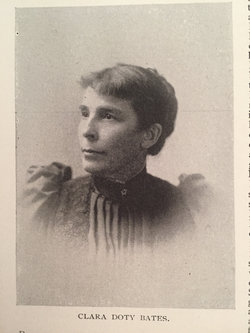
She laid a beautiful egg of gold;
And at last the Giant began to snore;
Jack waited a minute, then, growing bold,
He crept from the oven along the floor,
And caught the hen in his arms, and then
Fled through the door.
But the Giant heard him leave the house,
And followed him out, and bellowed “Oh-oh!”
But Jack was as nimble as a mouse,
And sang as he rapidly slipped below:
“Hitchity-hatchet, my little red jacket,
And down I go!”
And the Giant howled, and gnashed his teeth.
Jack got down first, and, in a flash,
Cut the ladder from underneath;
And Giant and Bean-stalk, in one dash,–
No shilly-shally, no dilly-dally,–
Fell with a crash.
This brought Jack fame, and riches, too;
For the little gold-egg hen would lay
An egg whenever he told her to,
If he asked one fifty times a day.
And he and his mother lived with each other
In peace alway.
Clara Doty Bates
(1838 – 1895)
Jack And The Bean-Stalk
Versified by Mrs. Clara Doty Bates
fleursdumal.nl magazine
More in: Archive A-B, Archive A-B, Bates, Clara Doty, Children's Poetry, Grimm, Andersen e.o.: Fables, Fairy Tales & Stories, Tales of Mystery & Imagination

Sonnet d’automne
Ils me disent, tes yeux, clairs comme le cristal:
«Pour toi, bizarre amant, quel est donc mon mérite?»
— Sois charmante et tais-toi! Mon coeur, que tout irrite,
Excepté la candeur de l’antique animal,
Ne veut pas te montrer son secret infernal,
Berceuse dont la main aux longs sommeils m’invite,
Ni sa noire légende avec la flamme écrite.
Je hais la passion et l’esprit me fait mal!
Aimons-nous doucement. L’Amour dans sa guérite,
Ténébreux, embusqué, bande son arc fatal.
Je connais les engins de son vieil arsenal:
Crime, horreur et folie! — Ô pâle marguerite!
Comme moi n’es-tu pas un soleil automnal,
Ô ma si blanche, ô ma si froide Marguerite?
Charles Baudelaire
(1821 – 1867)
Sonnet d’automne
Fleurs du mal (Flowers of Evil)
• fleursdumal.nl magazine
More in: Archive A-B, Archive A-B, Baudelaire, Les Fleurs du Mal

China 1899
She lies, a grave disdain all her defence,
Too imperturbable for scorn. She hears
Only the murmur of the flowing years
That thunder slowly on her shores immense
And ebb away in moaning impotence.
Giants enduring, she and Time are peers—
Her dream-hazed eyes knowing no hopes, no tears,
Her glance a langour-lidded insolence.
And though the rabble of the restless West
In her deserted courts set their rash sway,
She heeds them not; as when the sun, withdrawn
From his untarnished sky, knows it distressed
By storm of weakling stars, that he at dawn
Will wither with one ruthless glance away.
Arthur Adams
(1872-1936)
China 1899
• fleursdumal.nl magazine
More in: Adams, Arthur, Archive A-B, Archive A-B
Vincent Berquez is a poet and artist, living in London with his wife and son. He was born to French parents and attended the French Lycée and Cannock boarding school.
 Berquez studied Fine Art at Goldsmith’s; followed by The Camden Institute, where he was taught by Frank Auerbach.
Berquez studied Fine Art at Goldsmith’s; followed by The Camden Institute, where he was taught by Frank Auerbach.
He worked as an artist for many years prior to studying museology and conservation at London University following which he worked as a curator and conserver at various institutions, including the British Museum, and the Louvre.
Berquez has published in Britain, Europe, America and New Zealand. His work is in many anthologies, collections and magazine worldwide. Vincent Berquez was requested to write a Tribute as part of ‘Poems to the American People’ for the Hastings International Poetry Festival for 9/11, read by the mayor of New York at the podium.
He has also been commissioned to write an eulogy by the son of Chief Albert Nwanzi Okoluko, the Ogimma Obi of Ogwashi-Uku to commemorate the death of his father.
Vincent Berquez has been a judge many times, including for Manifold Magazine and had work read as part of Manifold Voices at Waltham Abbey. He has recited many times, including at The Troubadour and the Pitshanger Poets, in London. In 2006 his name was put forward with the Forward Prize for Literature. Recently he was awarded a prize with Decanto Magazine. Berquez is now a member of London Voices who meet monthly in London, U.K
Berquez has also been collaborating in 07/08 with a Scottish composer and US film maker to produce a song-cycle of seven of his poems for mezzo-soprano and solo piano. These are being recorded at the Royal College of Music under the directorship of the concert pianist, Julian Jacobson. In 2009 he contributed 5 poems for the edition of A Generation Defining Itself, as well as 3 poems for Eleftheria Lialios’s book on wax dolls published in Chicago. He also made poetry films that have been shown at various venues, including a Polish/British festival in London, Jan 07.
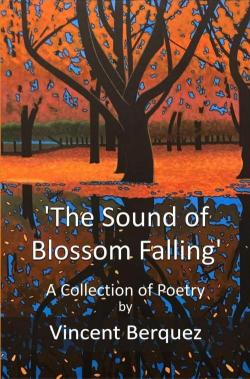 As an artist Vincent Berquez has exhibited world wide, winning prizes, such as at the Novum Comum 88’ Competition in Como, Italy. He has also worked with an art’s group, called Eins von Hundert, from Cologne, Germany for over 16 years. Berquez has shown his work at the Institute of Art in Chicago, US, as well as many galleries and institutions worldwide.
As an artist Vincent Berquez has exhibited world wide, winning prizes, such as at the Novum Comum 88’ Competition in Como, Italy. He has also worked with an art’s group, called Eins von Hundert, from Cologne, Germany for over 16 years. Berquez has shown his work at the Institute of Art in Chicago, US, as well as many galleries and institutions worldwide.
Recently he showed his paintings at the Lambs Conduit Festival, he took part in a group show called Gazing on Salvation, reciting his poetry for Lent and exhibiting paintings/collages.
He had a one-man show at Sacred Spaces Gallery with his Christian collages in 2007. In 2008 Vincent Berquez had a solo show of paintings at The Foundlings Museum and in 2011 an exposition with new work in Langham Gallery London.
Vincent Berquez has published regularly in fleursdumal.nl magazine for many years.
His book of poetry, called: The Sound of Blossom Falling, was recently published by CyberWit in London.
“The main point about these poems is deep emotion and concrete theme. We notice very impressive ardour of imagination in these poem.”
The Sound of Blossom falling
He talks of her with the simple love of a father,
describing how they walked the verdant path
and along the softness of the hardy hills
entwined in each other’s presence.
He feeds the dialogue of his love of nature
as he gazes and points out
the crisp colours and myriad greens –
he asks if she sees what he sees,
if she hears what he hears –
and as she looks and thinks
with a bright child’s mind
she says ‘I can hear the sound of blossom falling.’
They both stand still and listen for a moment.
The Sound of Blossom Falling
Author: Vincent Berquez
Poetry
Binding: Paperback
Language: English
86 pages
Publisher: Cyberwit.net
Pub. Date: 2021
ISBN-10: 9390601096
ISBN-13: 978-9390601097
Dimensions: 13.97 x 0.56 x 21.59 cm
£10.89
• fleursdumal.nl magazine
More in: #Editors Choice Archiv, - Book News, - Bookstores, Archive A-B, Archive A-B, Berquez, Vincent
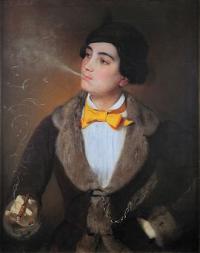
Die wilde Rose
Da droben auf einsamer Höhe
Die wilde Rose blüht,
Und wer sie von Ferne gesehen,
In heißer Sehnsucht erglüht.
Zu ihr über Felsen und Klüfte
Ein kühner Jäger klimmt.
Schon ist er in nächster Nähe –
Das Auge in Thränen ihm schwimmt.
Er will sie erfassen und pflücken.
Da strauchelt jäh sein Fuß;
Des Abgrunds finstere Tiefe
Empfängt ihn mit kaltem Kuß.
Da droben auf einsamer Höhe
Die wilde Rose blüht,
Und wer sie von Ferne gesehen.
In heißer Sehnsucht erglüht. –
Louise Aston
(1814-1871)
Die wilde Rose
• fleursdumal.nl magazine
More in: # Classic Poetry Archive, Archive A-B, Archive A-B, Feminism
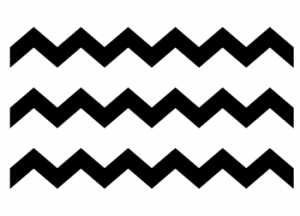
Die Tänzerin
Denn tanzen muss sie.
Dem tollen Rad verflochten
Gliedert sie Chaos,
Schwendet Quellen,
Stampft zuckende Krater.
Im Drang
Des großen Taktes
Tanzt sie Gestirne.
Bess Brenck-Kalischer
(Betty Levy, 1878-1933)
Die Tänzerin
• fleursdumal.nl magazine
More in: #Editors Choice Archiv, Archive A-B, Archive A-B

Achter de dijk
Achter de dijk ligt
water. Ik weet het.
Er gaan boten doorheen
en de meeuwen kennen
het getij.
Zo af en toe duikt
er wel eens een
zekerheid op.
Bert Bevers
Achter de dijk
Gedicht
Uit: Het verlangen naar heimwee, Dijkpers, Bath, 1982
• fleursdumal.nl magazine
More in: Archive A-B, Archive A-B, Bevers, Bert
Master Suffering pendulates between yield and command; the bodies of this book are supplicant yet seething—they want nothing more than to survive.
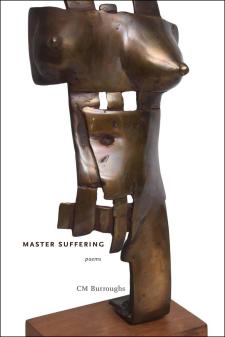
But how does a woman survive?
One’s own healthy body helps, but illness is one of the masters of this book.
Faith can be a salve for the inscrutable ailments of the body, but God is unreliable in these poems.
The female bodies of Master Suffering want power; they want to control and to correct the suffering they witness and withstand.
CM Burroughs is Associate Professor of Poetry at Columbia College Chicago. She is the author of two collections: The Vital System (Tupelo Press, 2012) and Master Suffering (Tupelo Press, 2020.) Burroughs has been awarded fellowships and grants from Yaddo, the MacDowell Colony, Djerassi Foundation, Virginia Center for the Creative Arts, and Cave Canem Foundation. She has received commissions from the Studio Museum of Harlem and the Warhol Museum to create poetry in response to art installations. Burroughs’ poetry has appeared in many journals and anthologies.
Master Suffering
Poems
by CM Burroughs
Format: Paperback
Published: Jan. 2021
Tupelo Press, Inc.
ISBN: 978-1-946482-38-9
$18.95
• fleursdumal.nl magazine
More in: #Editors Choice Archiv, - Book Lovers, - Book News, Archive A-B, Archive A-B, Art & Literature News

Grey Eyes
She glanced across the path to me,
Grey eyes!
Her looks were kisses plain to see.
I gave her glances back to her —
Glad eyes!
She saw the lifting of despair.
From memory a face looked out,
Dim eyes!
No years could sour that love to doubt.
My soul would nevermore be lone —
Bride’s eyes!
Hearts still were waiting for my own.
Our souls uncurtained then, perchance —
Deep eyes!
Each built an epoch in a glance.
Out of her fellowship so free
Light eyes!
She gave some gladness unto me.
And I gave? As we turned apart —
Dead eyes!
I saw the shudder in her heart.
Arthur Adams
(1872-1936)
Grey Eyes
• fleursdumal.nl magazine
More in: Adams, Arthur, Archive A-B, Archive A-B
 Deze bundel, vrucht van een verblijf in Death Valley, is een verzameling van veranderlijke landschappen en de wisselende lichamen die zich erin voortbewegen.
Deze bundel, vrucht van een verblijf in Death Valley, is een verzameling van veranderlijke landschappen en de wisselende lichamen die zich erin voortbewegen.
De gedichten zelf zijn evenzovele oefeningen in waarneming.
In de ruimten tussen aanblik en uiterlijke verschijning ontstaan beelden, onderhevig aan kleuren, texturen en zintuigen.
En deze beelden rijgen zich aaneen tot wat misschien wel feministische natuurgedichten kunnen worden genoemd over zaken als erotiek, bloei, geweld en kwetsuur:
‘de woestijn woelt en sleept haar laken mee
er ontwaakt
een vrouw zonder beschadigingen, ze kleedt zich
voor een dagtocht, ze zeult geen geesten’.
Charlotte Van den Broeck (1991) maakte op overdonderende wijze haar entree in de Nederlandse literatuur. Haar eerste twee dichtbundels werden overladen met lof en bekroond met de Herman de Coninck Debuutprijs en de Paul Snoeckprijs. Haar prozadebuut Waagstukken, een bestseller met 15.000 verkochte exemplaren, viel eveneens in de prijzen.
Aarduitwrijvingen
Gedichten
Auteur: Charlotte Van den Broeck
Uitgeverij: De Arbeiderspers
Publicatiedatum: 14-09-2021
Paperback
NUR: 306
ISBN: 9789029539722
Prijs: € 19,99
• fleursdumal.nl magazine
More in: - Book News, - Bookstores, Archive A-B, Archive A-B
Thank you for reading Fleurs du Mal - magazine for art & literature